Ukraine crisis: Shelling spreads despite ceasefire
- Published
It was always going to be a fragile uncertain ceasefire at best, reports Nick Childs
Shelling is reported from several places in eastern Ukraine despite the official ceasefire between government forces and pro-Russia rebels.
Artillery fire could be heard in the region's biggest city, Donetsk, where the truce had been observed so far.
Ukrainian military sources also accused rebels of shelling positions near the port city of Mariupol.
The fighting comes as Russia, Ukraine, France and Germany held further talks over the phone.
Most of the renewed fighting in Donetsk appears to be in the north of the city towards the airport.
The BBC's Ian Pannell, who is in the city, says it sounded like shells were being fired in both directions, although that could not be verified.
The BBC's Ian Pannell reports from the outskirts of Donetsk: ''We have been hearing the sound of shells going in and coming out''
Further south, a spokesman for the Ukrainian government forces said rebel units had attacked the village of Shirokyne, killing one soldier, with shells also fired towards Mariupol.
The government-held port city of Mariupol is in a highly strategic position, sitting between rebel-held eastern areas and Crimea, which Russia annexed nearly a year ago.
The Organisation for Security and Co-operation in Europe (OSCE) - which is charged with monitoring the ceasefire - also reported more shelling near the embattled town of Debaltseve which observers have not been able to reach.
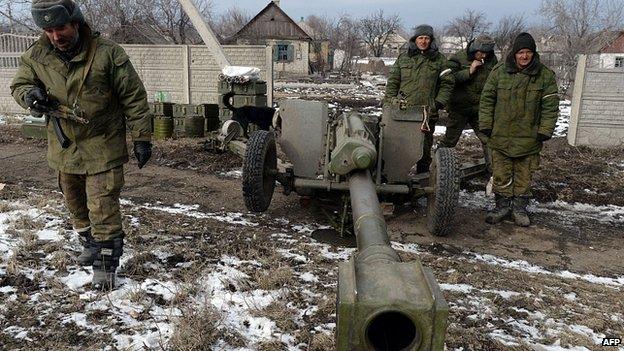
These rebels took up a position in Uglegorsk, near Debaltseve, on Thursday
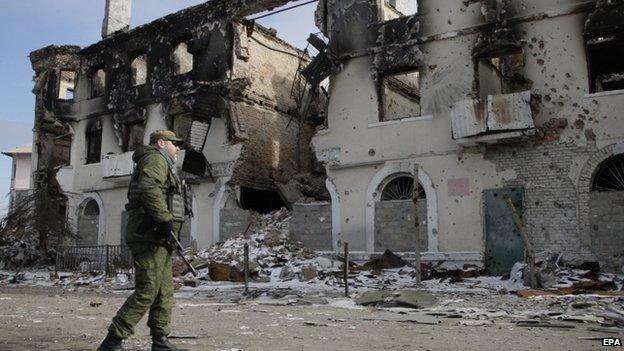
Months of fighting around Debaltseve have left many buildings in ruins
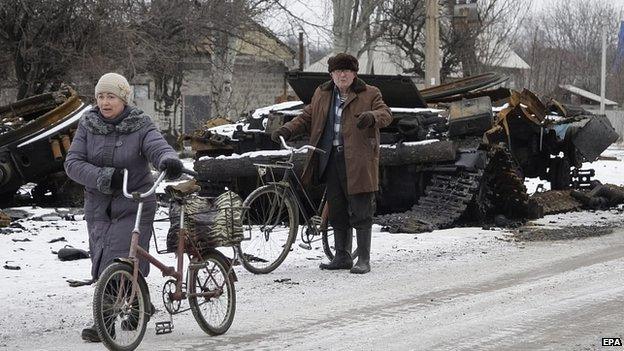
Thousands of people are trapped in the conflict zone in and around Debaltseve
The town, a railway hub that links the two rebel-held cities of Luhansk and Donetsk, fell to the rebels on Wednesday.
The US said on Thursday it was "deeply troubled" by reports of continued fighting.
A White House spokesman said the ceasefire agreement was "not a shopping list" and those who signed up to it had to abide by all their commitments.
Semen Semenchenko, a member of the Ukrainian parliament who leads the volunteer Donbass Battalion, told the BBC he blamed the fall of Debaltseve on the Ukrainian army command and called for it to be overhauled.
"I can assure you that we lost Debaltseve not because of the Russian military advantage, but because our generals refuse to take responsibility," he said.
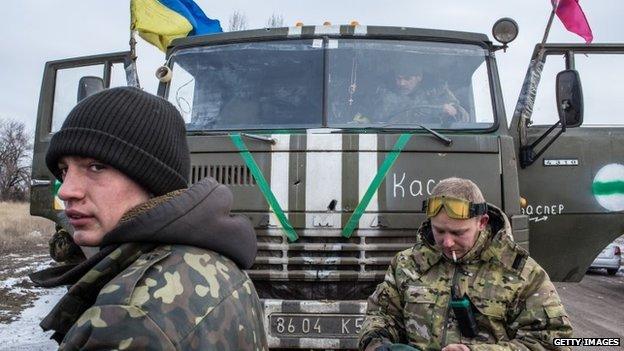
Ukrainian government forces pulled out of Debaltseve on Wednesday
In another development, Russian energy giant Gazprom said it had begun supplying gas directly to rebel-held parts of eastern Ukraine. It came after the Ukrainian government cut supplies to the east because of pipes damaged in the fighting.
The continued fighting prompted talks over the phone on Thursday between the leaders of Russia, Ukraine, France and Germany, who negotiated the ceasefire deal in Minsk last week.
The French presidency said afterwards the leaders had called for "the implementation of the full package of measures agreed in Minsk" including a full ceasefire, withdrawal of heavy weapons and the release of prisoners.
A statement issued by the Kremlin stressed the need to ensure a ceasefire and said all sides were ready to support the work of the OSCE mission in Ukraine.
After government forces withdrew from Debaltseve on Wednesday, Ukraine's President Petro Poroshenko called for a UN-mandated peacekeeping force to enforce the ceasefire.
Mr Poroshenko said Russia could not be part of any peacekeeping operation
But Russia's UN ambassador Vitaly Churkin denounced the call as a destructive move.
"It raises suspicions that he wants to destroy the Minsk accords," Mr Churkin said.
Mr Poroshenko had suggested a police mission by the European Union would be the best format for a UN-mandated peacekeeping operation.
But speaking on Thursday after talks with EU Commissioner Johannes Hahn, Mr Poroshenko said Russia could not be part of any peacekeeping mission.

Analysis: Jonathan Marcus, BBC defence and diplomatic correspondent
Could a peacekeeping force help to secure the ceasefire in eastern Ukraine?
Well for a start there would need to be a functioning ceasefire; nobody is going to send troops into an active war zone. Just getting agreement at the UN for such a force might be an insurmountable diplomatic hurdle.
Russia - with a key veto power on the Security Council - is not just an interested bystander. Despite its denials, it is seen by Ukraine and the West as an active participant in the conflict.
An effective peacekeeping force paradoxically might be in nobody's interests. Peacekeepers tend to fix battle lines in place. In Ukraine both sides probably have further ambitions on the ground. The Russian-backed separatists may well want to advance further and the Ukrainian government's forces certainly aspire to take back territory that they have lost.
Many experts fear there is a lot more fighting to be done whether this ceasefire is implemented or not.

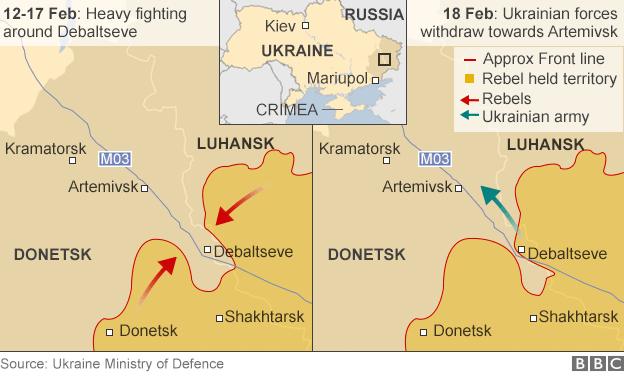
Mr Poroshenko had described the withdrawal from Debaltseve as organised but admitted at least six soldiers had been killed and more than 100 wounded. At least 80 are reported missing.
Rebel spokesman Eduard Basurin said the town was now "completely under the control" of the separatists, with just "scattered" pockets of resistance that were being "neutralised".
He claimed that more than 300 government soldiers had been taken prisoner. Ukraine's government has admitted some troops were being held.
Ceasefire from 00:01 on 15 February (22:01 GMT 14 February)
Heavy weapons to be withdrawn, beginning on 16 February and completed in two weeks - beyond a buffer zone behind the current front line for Ukrainian forces and behind the September front line for separatist forces
All prisoners to be released; amnesty for those involved in fighting
Withdrawal of all foreign troops and weapons from Ukrainian territory. Disarmament of all illegal groups
Ukraine to allow resumption of normal life in rebel areas, by lifting restrictions
Constitutional reform to enable decentralisation for rebel regions by the end of 2015
Ukraine to control border with Russia if conditions met by the end of 2015

Do you live in eastern Ukraine or have friends and family in the region? What do you think about the recent developments? You can email your experiences to haveyoursay@bbc.co.uk, external
Please include a contact number if you wish to be contacted by a BBC journalist.